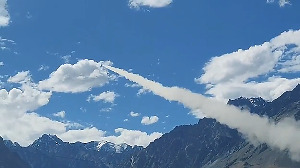Ambassador A K Damodaran was the last link between the freedom struggle and Indian diplomacy, the last of those, who walked from a British prison to take on national responsibilities, says T P Sreenivasan.
Ambassador A K Damodaran is no more. We will not see him again, with books in hand, at the India International Centre or the Nehru Memorial Library, his favourite haunts.
We will not hear his sharp observations on world affairs in unaccented English.
We will miss the last link between the freedom struggle and Indian diplomacy, the last of those, who walked from a British prison to take on national responsibilities.
We will miss a quintessential Malayali, who was as much at home in a mundu in his native village in Thripunithura as in Saville Row suits in Beijing, Moscow, Rome, Stockholm and New Delhi.
We will miss a diplomat, who was equally proficient in English and Malayalam literature and wrote in both the languages elegantly and profusely.
In Kerala terms, we have lost the kind 'Karavanar' (uncle), the head of the matriarchal 'tharawad' or homestead, to whom one could go for help and advice. The Indian Foreign Service has lost one of its 'Bhishma pitamahas.'
And yet, I shall not mourn his passing away. We ought to celebrate his productive and virtuous life in the service of the nation till the very end.
He lived a full life, with a sound body and mind till he completed ninety years. He made a deep impact on the making and implementation of Indian foreign policy from key capitals and New Delhi much beyond the normal time for retirement.
His writings too helped policy makers in later years. He listened patiently to younger colleagues, absorbed the nuances in their thinking and applied the necessary correctives, where necessary.
Many generations of diplomats have testified in their tributes how much they owed him in their own growth as diplomats.
For me, he was a legend long before I met him. By the time I reached Moscow in 1974, he had finished his tenure there as deputy chief of mission and had moved on to Rome as ambassador.
But the legacy he had left behind was huge. His name was on the lips of everyone, those who worked under him, the Soviet bureaucracy and the Indian community.
His Kerala origin and his freedom fighter status had a special appeal, because Kerala was being remembered for having elected a Communist government to power for the first time in the world.
Of particular relevance was his contribution to the making of the Indo-Soviet Treaty of Friendship and Cooperation. Given India's commitment to nonalignment and its anxiety to remain equidistant from both the superpowers, the language of the treaty was nothing but revolutionary.
To agree to language which suggested that an attack on one country would tantamount to an attack on the other would have been anathema even to Indira Gandhi, however brave she was to break new ground to deal with the specific situation that arose in East Bengal.
Much soul searching and calculations must have gone into the final version and the vital interests of the country that determined the final version. Many of the top leaders and bureaucrats worked on the text, but by all accounts, it was AKD, who crossed the t's and dotted the i's to make it politically acceptable to the country.
The treaty did not face stiff opposition in the country because the context in which it was concluded and the immediate dangers that came on the horizon during the Bangladesh war.
Our embassy in Moscow was very much like a battleground during the 1971 war. The Indian generals had given the impression that the war would end faster than it actually did and, with each passing day, the Soviets got more and more restless and anxious about the threats from the US and China.
They wanted the war to end and pressed the Indian leaders and generals to speed up matters. The top military leaders on both sides were travelling constantly to monitor the war. I heard in Moscow how AKD managed the alarm and the anxiety in the Kremlin over the war as it prolonged.
It was to his credit that the situation at the Moscow front was managed when the war raged on inside East Bengal.
Our paths crossed several times in Delhi when I was in the foreign secretary's office and AKD headed the policy planning division. Each time it was an enlightening experience because his clarity of thinking and superior wisdom were of infinite value as I was learning the intricacies of high-level diplomacy.
I could see how with a touch here and there, he could turn a pedestrian draft into a perfect piece of art. His mastery over the language was such that he could introduce nuances into formulations of policy. But what fascinated me was his innate simplicity and humility.
Even after he left the government, he kept his interest in policy alive and shared his views in his writings and speeches. He may not have authored a memoir, but he has left his legacy for us to emulate.
His batch mate and friend, K Natwar Singh, summarised it when he said, 'Nobility and refinement of his character were something extraordinary. He was brilliant, erudite, wise and understanding. He was a matured and balanced individual.'
The last time I saw AKD was last year in the Asianet studio in Delhi where I recorded a conversation with him for my weekly television programme. It was a fascinating conversation, in which we discussed several global issues.
I was struck by his assertion at that time, despite several indications to the contrary, that India and China would work together in the future. He did not share my anxiety about a Chinese threat and he appeared to nurse the optimism that China's rise would not hurt India and the rest of the world.
Among the many legacies that AKD has left for the world are not only the many roles he played in Indian diplomacy and the many young minds he helped shape, but also his many writings.
Above all, he has bequeathed to the world of diplomacy an image of himself in Ramu Damodaran, who after a glorious innings in Prime Minister P V Narasimha Rao's office, chose to go into the labyrinthine bureaucracy of the United Nations, which has kept him out of the diplomatic limelight.
If he had remained in the foreign service, he would have occupied one of the top positions in the government today. He told me that he regretted his decision only when he noticed the lovely ambassadorial homes occupied by his peers, but I suspect that he missed the role cut out for him in the Indian diplomatic hierarchy.
I often wondered what AKD thought about it, but I was sure that he would not force his views even on his own son.
T P Sreenivasan is a former ambassador of India to the United Nations, Vienna, and a former Governor for India at the International Atomic Energy Agency, Vienna.
He is executive vice-chairman, Kerala State Higher Education Council; member, National Security Advisory Board; member, India-UK Roundtable; and director general, Kerala International Centre.
You can read more of his writings here.









